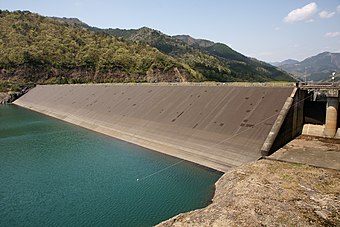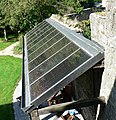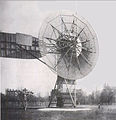Portal:Renewable energy
Introduction Renewable energy (or green energy) is energy from renewable natural resources that are replenished on a human timescale. The most widely used renewable energy types are solar energy, wind power, and hydropower. Bioenergy and geothermal power are also significant in some countries. Some also consider nuclear power a renewable power source, although this is controversial. Renewable energy installations can be large or small and are suited for both urban and rural areas. Renewable energy is often deployed together with further electrification. This has several benefits: electricity can move heat and vehicles efficiently and is clean at the point of consumption. Variable renewable energy sources are those that have a fluctuating nature, such as wind power and solar power. In contrast, controllable renewable energy sources include dammed hydroelectricity, bioenergy, or geothermal power. Renewable energy systems have rapidly become more efficient and cheaper over the past 30 years. A large majority of worldwide newly installed electricity capacity is now renewable. Renewable energy sources, such as solar and wind power, have seen significant cost reductions over the past decade, making them more competitive with traditional fossil fuels. In most countries, photovoltaic solar or onshore wind are the cheapest new-build electricity. From 2011 to 2021, renewable energy grew from 20% to 28% of global electricity supply. Power from the sun and wind accounted for most of this increase, growing from a combined 2% to 10%. Use of fossil energy shrank from 68% to 62%. In 2022, renewables accounted for 30% of global electricity generation and are projected to reach over 42% by 2028. Many countries already have renewables contributing more than 20% of their total energy supply, with some generating over half or even all their electricity from renewable sources. The main motivation to replace fossil fuels with renewable energy sources is to slow and eventually stop climate change, which is widely agreed to be caused mostly by greenhouse gas emissions. In general, renewable energy sources cause much lower emissions than fossil fuels. The International Energy Agency estimates that to achieve net zero emissions by 2050, 90% of global electricity generation will need to be produced from renewable sources. Renewables also cause much less air pollution than fossil fuels, improving public health, and are less noisy. The deployment of renewable energy still faces obstacles, especially fossil fuel subsidies, lobbying by incumbent power providers, and local opposition to the use of land for renewable installations. Like all mining, the extraction of minerals required for many renewable energy technologies also results in environmental damage. In addition, although most renewable energy sources are sustainable, some are not. (Full article...) Selected article -Mandatory renewable energy targets are part of government legislated schemes which require electricity merchandisers to source-specific amounts of aggregate electricity sales from renewable energy sources according to a fixed time frame. The objective of these schemes is to promote renewable energy and decrease dependency on fossil fuels. If this results in an additional expenditure of electricity, the additional cost is distributed across most customers by increases in other tariffs. The cost of this measure is therefore not funded by the government budgets, except for costs of establishing and monitoring the scheme and any audit and enforcement actions. As the cost of renewable energy has become cheaper than other sources, meeting and exceeding a renewable energy target will also reduce the expenditure of electricity to consumers. At least 67 countries have renewable energy policy targets of some kind. In Europe, 28 European Union members states and 8 Energy Community Contracting Parties have legally binding renewable energy targets. The EU baseline target is 20% by 2020, while the United States also has a national RET of 20%. Similarly, Canada has 9 provincial RETs but no national target for renewable energy (although it does have a 2030 non-emitting target and coal phase-out by 2030). Targets are typically for shares of electricity production, but some are defined as by primary energy supply, installed capacity, or otherwise. While some targets are based on 2010-2012 data, many are now for 2020, which bonds in with the IPCC suggested greenhouse gas emission cuts of 25 to 40% by Annex I countries by 2020, although some are for 2025. (Full article...)Quotations -
– Lester R. Brown, Plan B 4.0: Mobilizing to Save Civilization, 2009. Main topicsRenewable energy sourcesGeneralRenewable energy commercialization · Smart grid · Timeline of sustainable energy research 2020–present Renewable energy by countryList of countries by electricity production from renewable sources
WikiProjectsWikiProjects connected with renewable energy: Selected image -
The Tataragi Dam serving the Okutataragi Hydroelectric Power Station is one of the largest pumped-storage power stations in the world, and the largest in Japan. Selected biography -Hermann Scheer (29 April 1944 – 14 October 2010) was a Social Democrat member of the German Bundestag (parliament), President of Eurosolar (European Association for Renewable Energy) and General Chairman of the World Council for Renewable Energy. In 1999, Scheer was awarded the Right Livelihood Award for his "indefatigable work for the promotion of solar energy worldwide". Scheer believed that the continuation of current patterns of energy supply and use would be environmentally, socially, economically, and politically damaging, with renewable energy being the only realistic alternative. Scheer had concluded that it is technically and environmentally feasible to harness enough solar radiation to achieve a total replacement of the foclear (fossil/nuclear) energy system by a global renewable energy economy. The main obstacle to such a change is seen to be political, not technical or economic. In 1999 he was one of the initiators of the German feed-in tariffs that were the major source of the rise of renewable energies in Germany during the following years. (Full article...)Did you know? -... that efficient energy use is most often achieved by adopting a more efficient technology or production process ? Energy efficient buildings, industrial processes and transportation could reduce the world's energy needs in 2050 by one third, and help controlling global emissions of greenhouse gases, according to the International Energy Agency. Energy efficiency and renewable energy are said to be the twin pillars of sustainable energy policy. General images -The following are images from various renewable energy-related articles on Wikipedia.
Related portalsCategoriesAssociated WikimediaThe following Wikimedia Foundation sister projects provide more on this subject:
Discover Wikipedia using portals |


































![Image 33Concentrated solar panels are getting a power boost. Pacific Northwest National Laboratory (PNNL) will be testing a new concentrated solar power system – one that can help natural gas power plants reduce their fuel usage by up to 20 percent.[needs update] (from Solar energy)](http://178.128.105.246/cars-http-upload.wikimedia.org/wikipedia/commons/thumb/8/82/Photo_of_the_Week-_Boosting_Solar_Technology_%288722948189%29.jpg/120px-Photo_of_the_Week-_Boosting_Solar_Technology_%288722948189%29.jpg)















































